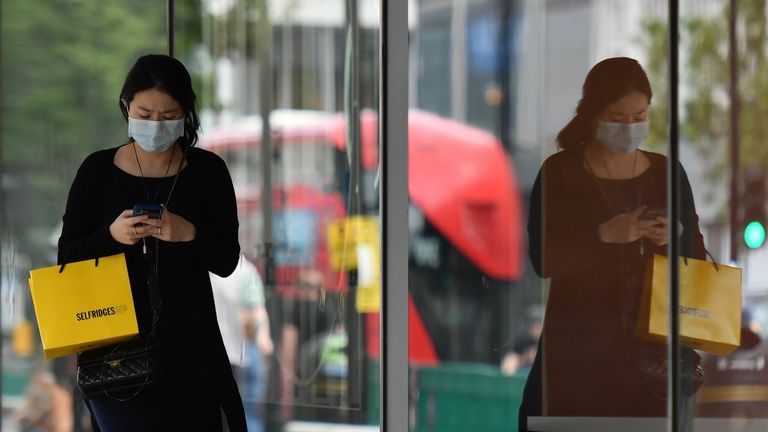If there is one constituency entitled to feel particularly aggrieved by the government's sudden U-turn in introducing a second national lockdown, it is business.
Above all else, businesses require certainty in order to operate smoothly, whether that is certainty over rules and regulations, interest rates or the wider economy in which they are operating.
Live updates on coronavirus from UK and around world
Apart from interest rates, which remain at an all-time low, businesses have had none of that recently.
Instead, they have had unpredictability, with the prime minister seemingly ruling out a second national lockdown right up until newspapers learned about it on Friday evening.
The sense of dismay and irritation was tangible in the response from business leaders to the news.
Helen Dickinson, director of the British Retail Consortium, spoke of the "untold damage" that the move would do to the country's high streets.
Jonathan Geldart, director general of the Institute of Directors, said the measures would "put great strain on an already fragile business community".
Adam Marshall, director general of the British Chambers of Commerce, observed that "the new restrictions will be devastating for businesses".
And Dame Carolyn Fairbairn, the outgoing director general of the CBI, noted: "It's clear that communication needs to improve. Firms can't plan on the basis of speculation."
Off the record, businesses are less diplomatic.
As one un-named industry leader told The Times at the weekend: "They just haven't got a clue.
"What you used to have in the Tory party is a group of people who used to be in business.
"Now you have failed fireplace salesman Gavin Williamson [the education secretary] as a metaphor for the whole of government.
"Other than [Chancellor Rishi] Sunak, very few of them have worked in a proper job."
Central to that sense of irritation are a couple of factors.
The first is that businesses in the leisure, hospitality and retail sectors in particular have invested hundreds of millions of pounds in making their premises safe for employees and customers.
Many will now feel that money has been wasted if they are forced to close again for the next four weeks.
And many will also be concerned at the hint from Michael Gove, in his Sky News interview yesterday, that the second national lockdown may exist for longer than the four weeks currently planned.
Retailers call the final three months of the year the "golden quarter" in which they generate most of their profits for the year.
They will be especially desperate to open properly ahead of Christmas.
The second factor is that, while the extension of the furlough scheme is welcome, it will not be enough to spare some businesses, especially smaller ones, from the agony of making redundancies.
The original furlough scheme was telegraphed months ago as ending on 31 October and, accordingly, some businesses will have been letting colleagues go in anticipation.
The furlough scheme also only addresses one specific overhead for businesses - payroll costs - rather than other overheads, such as rents, that will continue to mount while their premises are closed.
Moreover, with firms now in a weaker financial state than they were going into the first lockdown, there are likely to be more business failures than last time and especially if the second national lockdown drags on beyond 2 December.
Compounding that is the continuing uncertainty over the rules under which companies trading with the EU will be operating come the end of the Brexit transition period.
While the suspicion remains that a "thin" trade deal will be agreed with the EU, before the end of the year, the government's professed willingness to go ahead with a no-deal Brexit if necessary has sowed dismay.
As Dame Carolyn put it in her speech to the CBI's annual conference today: "It would be unconscionable to unleash a no-deal Brexit on the countries of Europe and the UK during a second wave."
The prime minister was due originally to address that conference but, instead, he sent Alok Sharma, the business secretary, in his place.
That might be taken as a slight in some quarters as well.
How much damage could be done by a second lockdown?
A few individual snapshots have already emerged today via trading statements issued by a handful of companies.
Associated British Foods, the Ryvita-to-Silver Spoon food and drink giant, said that sales at Primark, its discount fashion chain, would be hit by £375m during the four weeks.
GVC Holdings, the owner of Ladbrokes and Corals, said that its earnings would be hit by £34m were it to be forced to close its high street betting shops for a month.
And Hiscox, the insurer, said it was facing exposure of between $30-40m (£23-30m) if current restrictions on travel mass gatherings continue into 2021.
Across the City this morning, equities analysts have been adjusting their spreadsheets, factoring in how the latest restrictions will impact earnings.
The retail and leisure teams at the stockbroker Shore Capital told clients: "Within this poor and tiresome setting, the new lockdown is little short of a disaster for the casino operators, café owners, public house proprietors and store-based retailers seeking to earn a crust in England, plus all of their suppliers, it should be said.
"Hence, we see a further institutionalisation of behaviour that is going to contract the size of prevailing markets and the capacity therein.
"We forecast at the start of the pandemic in the spring that the food and beverage channel in the UK may contract by 20-30%.
"With this lockdown, possibly feeding into what was already going to be an already structurally contracted peak-December period, this forecast now looks conservative."
Charles Hall, head of research at the stockbroker Peel Hunt, said the hit to the economy from the second lockdown would probably not be as severe as the first one because it was likely to be shorter, because schools and universities were remaining open and businesses in manufacturing and construction were being encouraged to stay open.
He said a "tiered" approach to a withdrawal from restrictions might also help.
"Taking all those factors together, a fair estimate of economic output for November may be 7-10% lower than it would have been without Lockdown Two, with the bulk of the damage concentrated in the sectors that have been forced to close," Mr Hall said.
He warned, though, that the deterioration could be worse than that given that consumers may feel less resilient in the cold and damp of November than they had done when the sun was shining in April and May.
Mr Hall said it was also significant that, according to opinion polls, public confidence that the government was "doing the right thing" had declined.
Mr Sunak insisted today that he understood the frustration caused by the government's U-turn.
But he did little to inspire confidence among businesses by stating that he merely hoped England would exit lockdown on 2 December.
Many businesses will, accordingly, be looking to him to come up with targeted support for specific sectors, such as aviation and hospitality, as well as grants rather than just loans.
As Mike Cherry, national chair of the Federation of Small Businesses, told Sky News today: "Many have already borrowed up to the hilt because they were only allowed to take 25% of their turnover under the CBIL (coronavirus business interruption loan) scheme and, of course, many thousands of businesses have not had the business rates holiday - which is an upfront cost before you sell anything - or the original grants of either £10,000 or £25,000.
"So there needs to be much better thought around how we get businesses through this next period so that small businesses, who are going to be absolutely at the heart of the recovery, can get through into next spring and next summer."









